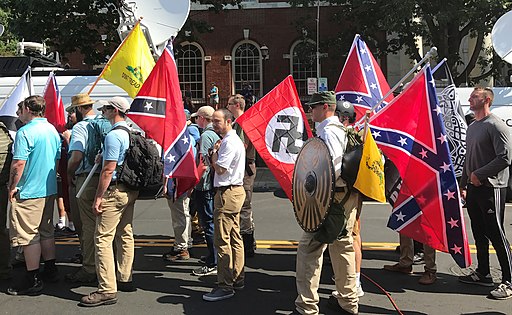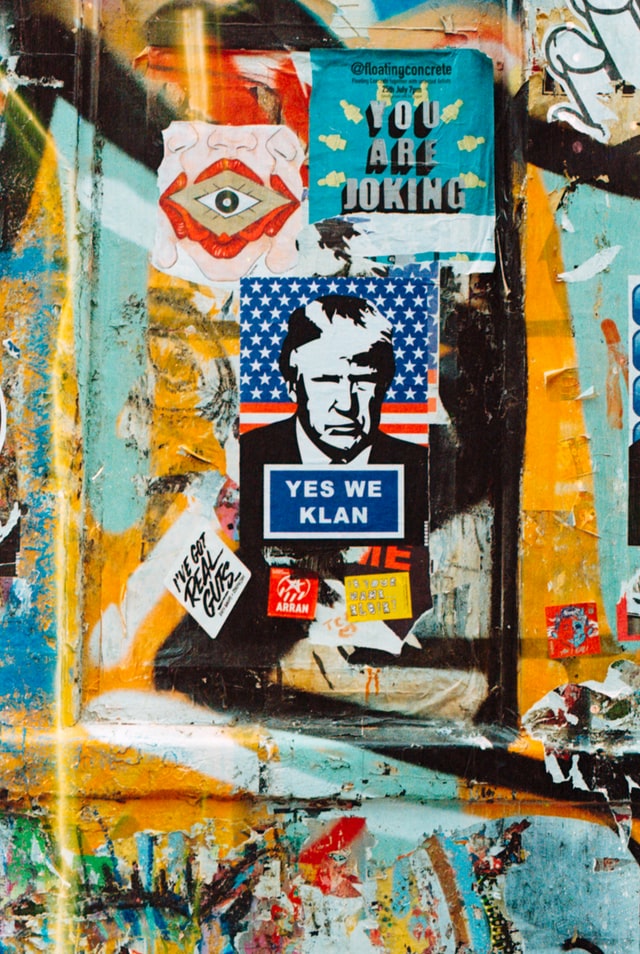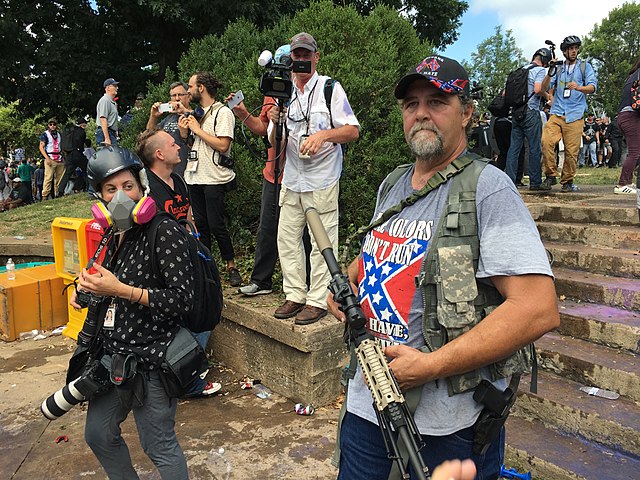
Young men are responsible for racial motivated shootings, like the 2017 Olathe, KS shooting and the 2019 El Paso, TX shooting. They have formed and joined alt-right groups like the Boogaloo Boys and Proud Boys. They are the majority of participants in alt-right themed discussions online. However, a large majority of young people, Gen Z and Millennials, are liberal and vote accordingly. So why are there still so many young men flocking to these alt-right groups?
Alt right groups function as an umbrella for men’s rights and white supremacist activists and have influenced many past and current events. They include: Google employee, James Damore’s memo about women’s inability to be equal to men and the Unite the Right march in Charlottesville which included an assault on a trans woman and death of another counter protestor.
Where Are These Alt-Right Groups Coming From?
America Has A Long History With White Supremacy.
While the civil rights movement was able to successfully generate some protections for African Americans, there has been no mass reckoning of the deeply embedded racist beliefs in our culture. –The Civil War and subsequent Jim Crow era are evidence of this. What followed afterward was the development of white nationalism: “[a] movement that emerged in the aftermath of the civil rights movement as a way to retheorize white supremacy after its day-to-day power was eroded in the 1960s.”
When other countries experienced similar national divisions, they initiated measures for unity – from the Holocaust Memorial in Berlin, Germany to Unity and Reconciliation programs in Rwanda. The lack of reconciliation work in our country has created an environment for hate groups to thrive.
Despite increasing exposure to immigrants and diverse populations through higher education and urbanization, racist attitudes remain. Ku Klux Klan membership persists, though other modern white supremacist groups such as Identity Evropa/American Identity Movement are growing quickly. Racism has also shown up in other public arenas: prevalent racial bias has been found in law enforcement agencies in the wake of shootings of unarmed black men, and studies reiterate the devastating impact of the existing racial wealth gap everyday.
What is the draw for young, especially white, men?
Alt right movements seek to maintain the current systems of concentrated power, which is typically in the hands of white men. Those who rely on these systems can feel abandoned as the world becomes more just as power is more evenly distributed. Any other group experiencing empowerment is a threat to their place.
Alt-Right Groups Offer Significance To Vulnerable, Young Men
As more disenfranchised groups pursue opportunities they were not previously able to, it’s not a far leap for young, white men to feel like opportunities are being taken from them, especially if those opportunities were previously afforded to their fathers. They are blaming those disenfranchised groups for their woes.
“In spite of all evidence to the contrary, they feel that the world has made it unfair for them, and they want revenge,” a Buzzfeed article appropriately summarizes, “The belief that you are a victim of society, despite all evidence to the contrary, is a driving force for violent white nationalists across the world.”

Anthony Crider via Wikimedia Commons
Many find brotherhood for the first time
Christian Picciolini [a former white supremacist recruit and now, writer] admitted in a Washington Post article, “The politics, the ideology wasn’t attractive to me at all. I didn’t even understand it, at 14 years old. But what was attractive was the sense of the identity, community and purpose that the movement provided.”
This desire for a sense of belonging and insecurity organizes alt right groups to leverage this need for belonging to recruit suggestable, and often extremely young, men.
The shared values of men’s rights activists, white supremacists, law enforcement actions, and then President Trump – often supported in action by the Republican party – creates what feels like a cloud of witnesses assuring these alt-right activists they’re on the right track.
Many joined looking for solidarity in the face of a world which doesn’t center them as before, and stayed because they found connections serving a purpose greater than themselves.
Jackson Katz, author of The Macho Paradox, confirms: “it’s not necessarily the ideology behind white nationalism, anti-feminism or the alt-right that initially appeals to young white men and boys as much as it is the sense of being part of a ‘heroic struggle.’ Participating in the alt-right community online “offers the seductive feeling of being part of a brotherhood, which in turn validates their manhood.”
The focus of white nationalist sites like The Daily Stormer on white men as young as 11 is also intentional. “These groups prey upon the natural awkwardness of adolescence,” observes Joanna Schroeder for the New York Times, “Many kids feel out of place, frustrated and misunderstood, and are vulnerable to the idea that someone else is responsible for their discontent.”
“Extremist recruiters understand,” says Gil Noam, an associate professor of psychology at Harvard Medical School whose research focuses on child and adolescent development, “that a child at this [young] age is more likely to respond to the pull of community and a sense of purpose, even if they don’t readily identify with a group’s core message.”
So in searching for significance and belonging, many young men become prime targets for white nationalist groups who are happy to fill in the ideological gaps.

How are they being recruited?
More and more young men are spending time playing video games. 47 percent of all men, and 72 percent of men younger than thirty play video games. In 2015, “22 percent of men between the ages of 21 and 30 with less than a bachelor’s degree reported not working at all in the previous year. Young men without college degrees have replaced 75 percent of the time they used to spend working with time on the computer, mostly playing video games, according to the study, which is based on the Census Bureau’s time-use surveys.”
Associated chat features have become tools for white nationalists to befriend and reach a younger audience. “He started to feel like he was in on something,” said John, father to a son who was recruited by white nationalists through video game chat rooms, in an NPR interview, “He was now in the in crowd with these guys. It provided some structure and identity that he was searching for at the time.”
Social media has also become a rich source of targets for alt right groups. With viral meme culture, and chat rooms like 4chan, 8chan, and men’s rights threads on Reddit, there are many avenues for propaganda to disseminate.
It’s in these social media groups that incels (involuntary celibate), red-pilled, and men’s rights groups can find solidarity in their insecurities and fringe beliefs. As a growing number of young men face unemployment1, the unlikelihood of marriage, and a rapidly changing narrative on gender roles and sexuality, they turn to these communities to vent and find support, but rapidly evolve towards a focus on scapegoating instead of self-improvement.
1 Page 144, The War on Normal People by Andrew Yang
For the more mature male audience, reckless journalism (from Facebook and FOX news) has become another source for radicalization.
Tucker Carlson, replacing Bill O’Reilly on FOX News, has also become a strong voice for racist, sexist, and homophobic messages. The Daily Stormer, a white supremacist website, calls him “literally [their] greatest ally,” and features him prominently on their page.
These aggressive and well-spread messages are a solid entryway for impressionable and isolated young men.
Christian Picciolini, a former white supremacist and founder of the Free Radicals Project says, “[Recruiting] really is just identifying vulnerable young people and then amplifying their passions [and] trying to fill those voids in their life, because I’ve never met a happy white supremacist,” he says. “I’ve never met one with positive self-esteem.”

Evan Nesterak via Wikimedia Commons
What Is The Path Forward?
Besides the violent insurrection at the Capitol earlier this month, there are other countless ways in which the alt right impacts our society. From the increase in hate crimes to the brutal outcomes of interrupted peaceful protests: alt right extremism leads to violence and division. Its growth needs to be stopped
Some have left alt right groups in the face of growing violence and unrest. They share lessons and regret over how they diverged from often progressive backgrounds, and spread harmful views. The group Free Radicals Project has even been formed to support those who are seeking reintegration after abandoning these insular communities.
When the vulnerabilities of young men exploited by the alt right movement can find a meaningful response elsewhere in society, they can begin to accept increasing equality in society. Because of this, the active fight against harmful ideologies begins with defining masculinity in a positive and productive way. [Jackson] Katz echoes this in a New York Times article: “To counteract the seductiveness of [the] appeal from the right, we need to offer them a better definition of strength: that true strength resides in respecting and lifting up others, not seeking to dominate them.”
“Parents also need to encourage our sons to think critically about the things they’re hearing online,” says Joanna Schroeder, “If we avoid talking about our values about race and the experiences of marginalized people, strangers on the internet will be happy to share theirs.”
On this same note, Shelly Tochluk, a professor of education at Mount Saint Mary’s University, Los Angeles, and author of “Witnessing Whiteness: The Need to Talk About Race and How to Do It” says, “Right now, our fear about addressing race causes us to leave kids guessing. They fill in the blanks with whatever they see online, and this includes horrifically twisted messages from white nationalists.”
Creating safe places for conversation while also demonstrating the courage to speak openly about personal growth and other vulnerabilities is the beginning of allowing men to define themselves in a purposeful way.
Unless we support and engage young men, and convince them of their worthiness and belonging exactly as they are, we can only expect more to be drawn toward the fruitless cry of supremacy.
Christine Cepelak is a writer and data scientist focused on race, gender, and climate justice. Follow her on Twitter: @CLcep.
